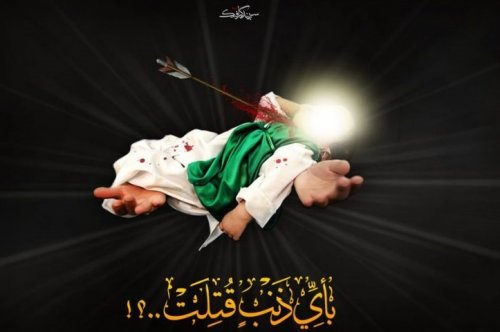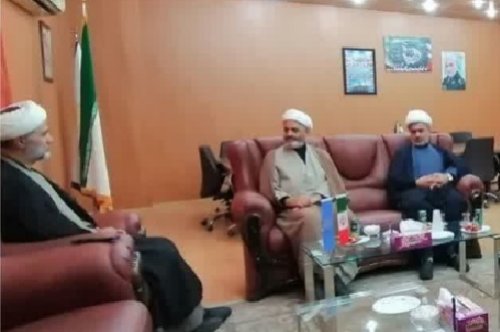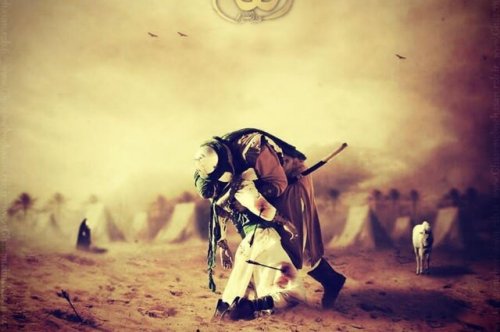The sixth night of Muharram, the night of Ashura teenagers and the night of Qasim bin Al-Hassan (peace be upon him)
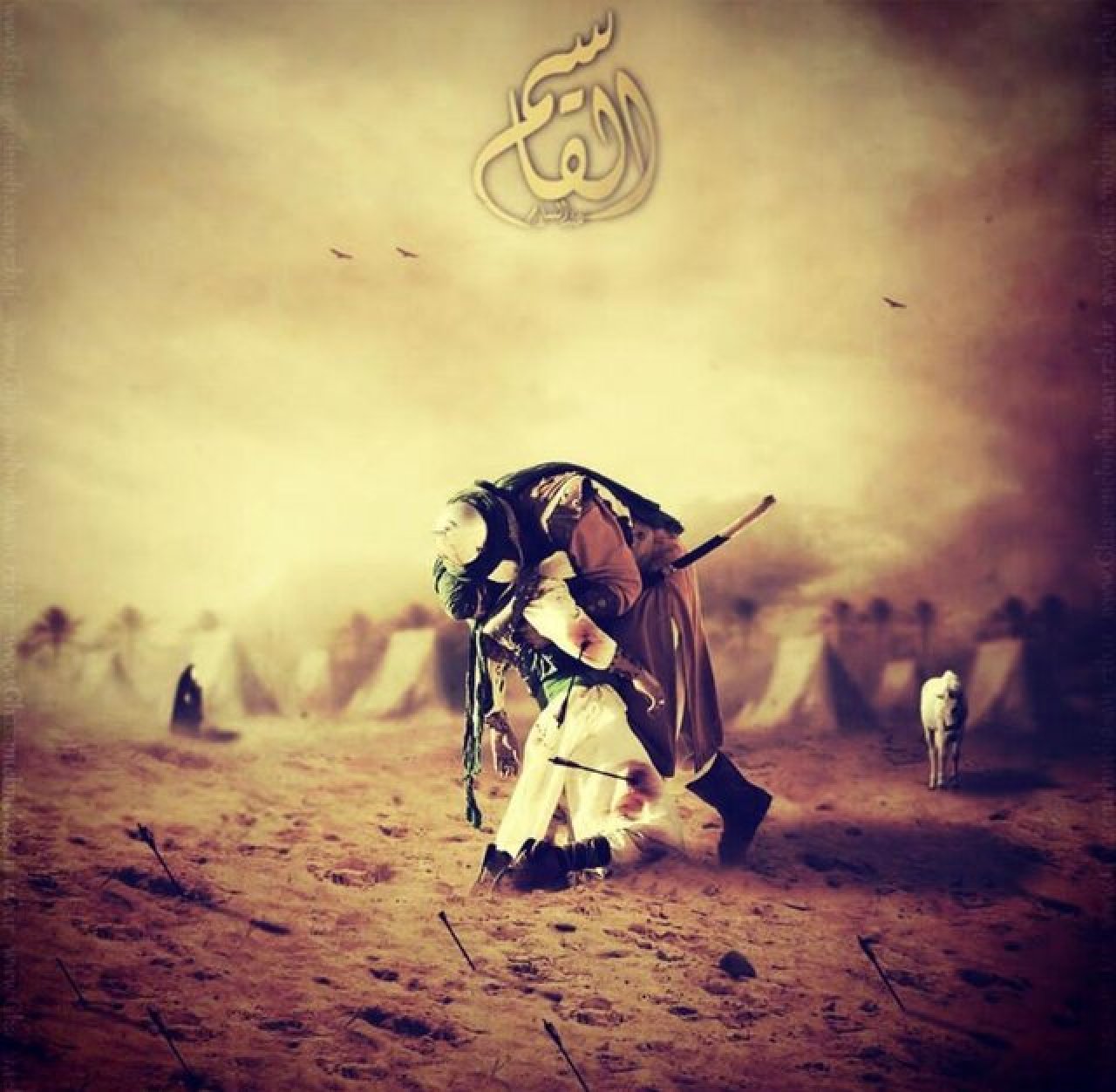
The sixth night of Muharram is the night of Ashura for teenagers and the night of Qasim bin Al-Hasan (peace be upon him). All the nights of Muharram city are named after the names of martyrs or personalities or events related to the Karbala incident, and the names of Muharram nights are determined over time. And this act of remembrance of the Ahl al-Bayt (peace be upon them) is done in imitation of special nights such as: Ashura and Tsawwa.
1- The lineage of Qasim bin Hasan
Qasim, the son of Imam Hassan (peace be upon him), was born in 47 AH in Madinah. [1] His mother was a mother [2] named "Nafileh" [3] or "Ramlah" [4] or "Narjes". [5] [6] He lost his honorable father at the age of two [7] and until his martyrdom, he was brought up in the loving and affectionate lap of his beloved uncle, Imam Hussain (peace be upon him), and he was present in the Karbala event together with his mother and other brothers and sisters.
2- Qasim on the night of Ashura
According to a quote on the night of Ashura, when Imam Hussain (peace be upon him) gave a sermon and said to his companions: "Tomorrow you and I will all be killed," he thought that this honor belongs to men and adults and does not include teenagers. So he asked: "Will I also be killed tomorrow?" Imam (peace be upon him) kindly asked: "My child, how is death in your eyes?" He said: "Ahli min al-Asal"; "Sweeter than honey." Hazrat said: Yes, I swear to God, uncle, you are one of those who will be killed after being caught in a severe calamity. [8][9]
3- Permission to enter the battlefield
According to Kharazmi, he had not reached the age of puberty when he was martyred. [10] How this teenager got permission from Imam Hussain (peace be upon him) to go to the field, shows the intensity of his knowledge, wisdom, courage and faith. Perhaps because of his age, at first Imam Hussein (peace be upon him) did not allow him to go to the field; But Qasim kissed the hands and feet of the Imam (peace be upon him) and insisted and begged until he got permission. Hazrat hugged him and both of them cried a little and Qasim asked for permission again and Imam Hussain (peace be upon him) refused. Qasim kisses the Imam's hands and feet and obeys his request. But the Imam (peace be upon him) did not allow it until finally he succeeded in receiving permission.[13]
Molhasin Kashifi writes about how Hazrat Qasim asked for permission from Imam Hussain (peace be upon him) and was not given permission by him: Finally, Hazrat Qasim got permission by showing the armband that his father Imam Hassan (peace be upon him) had tied on his arm and in which he had bequeathed to him never to stop helping his uncle Husayn (peace be upon him)... [14]
4- Singing in the battlefield
Qasim bin Hasan, while his tears were rolling down his cheeks, attacked the enemy by reciting this secret:
If you think so, then we are a branch of Al-Hasan, the tribe of the Prophet, Al-Mustafa, and the Faithful.
This is Hussain, like the prisoner of the dead among people, not righteous.
"If you don't know me, I am the branch of Hassan, the descendant of the chosen and trustworthy prophet. This Hussain is like a captive taken hostage among the people who has been deprived of rain water."[15][16][17]
According to the report of Ibn Shahrashob, Qasim recited the following hymn on the battlefield:
Ani Anna Al-Qasum, I am the descendant of Ali Nahn and Baitullah Oli Balanbi...
I am Qasim, a descendant of Ali. By the house of God, we are more worthy of the Prophet than Shammar Dhi al-Jawshan or the bastard (Ibn Ziyad). [18]
He finally achieved the high degree of martyrdom after killing a number of God's enemies.[19][20]
5- How Hazrat Qasim was martyred
Some sources have quoted the quality of Hazrat Qasim's martyrdom as follows, quoting Hamid bin Muslim:
"A young man came to us, his face shining like a crescent moon, he had a sword in his hand, a shirt and ezari (pants) on his body, and two sandals on his feet, and the strap of one of his sandals broke, I don't forget that it was the left strap. Amr bin Saeed Azdi told me: I will attack him by God! I said: Glory be to God, refuge in God! What do you want from this work, the multitude of the army surrounding him will finish his work. He said to God, I will attack him! He attacked and hit Qasim on the head with a sword. Qasim fell on his face and shouted "Amojan!" I swear to God, when the eagle got up, it attacked Qasim's killer like an angry lion and struck him hard. He shielded his hand, but the blow cut off his hand at the elbow. He screamed and pulled away. A group of Kufians attacked to save him, but they overpowered him and trampled him under the hoofs of horses until he died.[21]
In the encyclopedia of Imam Hossein (peace be upon him), it is stated as follows:
After being hit and falling from the horse, he called his uncle and Hussain (peace be upon him) quickly reached him and targeted Qasim's killer with his sword and cut off his hand. The enemy army rushed to save that person. According to the books of the old and famous fighter, in this attack, Qasim was martyred, he fell under the hands and feet of the army and perished; However, in some recent books and as a result, in rumors, it has been suggested that Qasim was killed under the hands and feet of the soldiers. It seems that the origin of this mistake is Bihar al-Anwar, and after that, it made its way to books such as: Naskh al-Tawarikh, Makhzan al-Baka, Mahij al-Ahzan and Asrar al-Shehadat.[22][23]
6- Imam's presence at Qasim's bedside
After Qasim was hit and Imam Hussain (peace be upon him) attacked his assailant, when the dust of the battlefield settled, Imam Hussain (peace be upon him) was standing on his bed, while he was dragging his feet to the ground. At that time, the Imam said: "Afterwards, the people will be killed, and their enemies will be killed on the Day of Judgment!"; "May the mercy of God be far away from the group that killed you and those whose argument on the Day of Resurrection is your grandfather!" This is God's Day of many and many and the words of the Nazarene"; "By God, it is very difficult for your uncle to call him and not be able to answer you, or to answer you but not benefit you, on a day like this when his enemies are many and his helpers are few." [28][29][30][31]
Hamid bin Muslim says: Then he picked him up, I saw the two legs of the boy dragging on the ground, and Husayn (peace be upon him) was putting his chest on his chest. I said to myself, "Where is he taking her?" He took him and placed him next to his son Ali Akbar (peace be upon him) and other martyrs. I asked the name of that teenager. They said he is Qasim bin Hasan (peace be upon him).[32][33][34][35][36][37]
7- Mention of Qasim in the pilgrimage of the district
He is mentioned in "Rajabia Pilgrimage" and "Holy District Pilgrimage". Hazrat Qasim is mentioned as follows in the pilgrimage of the Holy District:
"Peace be upon Al-Qasim bin Al-Hasan bin Ali, the one who was struck down on his back, the one who was crucified, when Al-Hussein called his aunt, he was like a falcon, and he was looking at the man. Yeh al-Turaab, and al-Hussain says: Later, the people will be slaughtered! And who is their enemy on the Day of Resurrection of your ancestors and your fathers."
"Peace be upon Qasim bin Hasan (peace be upon him) whose sword fell upon him and his armor was looted. When his uncle called Hussain, Hussain reached Qasim like a hunter. He saw Qasim rubbing his feet on the ground while dying. He said: May the mercy of God be far away from those people who killed you and those whose enemies are your ancestors and your father on the Day of Resurrection!" [38][39] [40][41]
Everyone who fell on the ground would call the Imam and the Imam would quickly come to his bedside. But oh, from that hour when Imam Hussain (peace be upon him) fell in the pit of the slaughterhouse with his body covered in blood, Zainab Kobri (peace be upon him) shouted: "O Muhammad! Wo Alyah, Wo Jafarah!
8 - Footnote
1. ↑ Mousavi Zanjani, Ibrahim, Wasila Al-Darin, p. 253.
2. ^ Abul Faraj Esfahani, Ali bin Hossein, Muqatil al-Talbeyin, pp. 57-58.
3. ↑ Sharif Qureshi, Baqir, Life of Imam al-Hasan bin Ali (peace be upon him), study and analysis, vol. 2, p. 460.
4. ↑ Samawi, Muhammad bin Tahir, Absar al-Ain fi Ansar al-Husayn (peace be upon him), p. 72.
5. ↑ Mohammadi Rishahri, Muhammad, Encyclopaedia of Imam Hossein (peace be upon him) based on the Qur'an, hadith and history, vol.7, p.120.
6. ↑ Mohammadi Rishahri, Muhammad, Encyclopaedia of Imam Hossein (peace be upon him) based on the Qur'an, hadith and history, vol.7, p.121.
7. ↑ Mousavi Zanjani, Ibrahim, Wasila Al-Darin, p. 253.
8. ↑ Bahrani, Hashem, Madinah al-Ma'ajj, vol.4, p.215.
9. ↑ Qomi, Sheikh Abbas, Nafs al-Mahmum, p.208.
10. ↑ Khwarazmi, Muwafq bin Ahmad, Maktal al-Hussein (peace be upon him), vol. 2, p. 31.
11. ↑ Mohammadi Rishahri, Muhammad, Encyclopaedia of Imam Hossein (peace be upon him) based on the Qur'an, hadith and history, vol.7, p.120.
12. ↑ Mohammadi Rishahri, Muhammad, Encyclopaedia of Imam Hossein (peace be upon him) based on the Qur'an, hadith and history, vol.7, p.121.
13. ↑ Khwarazmi, Muwafq bin Ahmad, Maktal al-Hussein (peace be upon him), vol. 2, p. 31.
14. ↑ Kashfi, Mulla Hossein, Rawda al-Shahada, vol. 1, p. 400.
15. ↑ Mohammadi Rishahri, Muhammad, Encyclopaedia of Imam Hossein (peace be upon him) based on the Qur'an, hadith and history, vol.7, p.120.
16. ↑ Mohammadi Rishahri, Muhammad, Encyclopaedia of Imam Hossein (peace be upon him) based on the Qur'an, hadith and history, vol.7, p.121.
17. ↑ Khwarazmi, Muwafq bin Ahmad, Maktal al-Hussein (peace be upon him), vol. 2, p. 31.
18. ↑ Ibn Shahr Ashub, Muhammad Bin Ali, Manaqib Al Abi Talib (peace be upon him), Vol. 3, p. 255.
19. ↑ Mohammadi Rishahri, Muhammad, Encyclopaedia of Imam Hossein (peace be upon him) based on the Qur'an, hadith and history, vol.7, p.120.
20. ↑ Mohammadi Rishahri, Muhammad, Encyclopaedia of Imam Hossein (peace be upon him) based on the Qur'an, hadith and history, vol.7, p.121.
21. ↑ Sepehr Kashani, Mohammad Taqi, Naskh al-Tawarikh, vol. 2, p. 328.
22. ↑ Mohammadi Rishahri, Muhammad, Encyclopaedia of Imam Hussain (peace be upon him) based on the Qur'an, Hadith and History, vol.7, p.122.
23. ↑ Mohammadi Rishahri, Muhammad, Encyclopaedia of Imam Hussain (peace be upon him) based on the Qur'an, Hadith and History, vol.7, p.123.
24. ↑ Mohammadi Rishahri, Muhammad, Encyclopaedia of Imam Hossein (peace be upon him) based on the Qur'an, hadith and history, vol. 7, p. 126.
25. ↑ Mohammadi Rishahri, Muhammad, Encyclopaedia of Imam Hossein (peace be upon him) based on the Qur'an, hadith and history, vol. 7, p. 127.
26. ↑ Sheikh Mufid, Al-Arshad fi Ma'rifa Hajjullah Ali Al-Abad, Vol. 2, p. 108.
27. ↑ Seyyed Ibn Tavus, Al-Malhouf Ali Qatali Al-Tufuf, p. 168.
28. ↑ Mohammadi Rishahri, Muhammad, Encyclopaedia of Imam Hossein (peace be upon him) based on the Qur'an, hadith and history, vol. 7, p. 126.
29. ↑ Mohammadi Rishahri, Muhammad, Encyclopaedia of Imam Hossein (peace be upon him) based on the Qur'an, hadith and history, vol. 7, p. 127.
30. ↑ Sheikh Mufid, Al-Arshad fi Ma'rifa Hajjullah Ali Al-Abad, Vol. 2, p. 108.
31. ↑ Seyyed Ibn Tavus, Al-Malhouf Ali Qatali Al-Tufuf, p. 168.
32. ↑ Mohammadi Rishahri, Muhammad, Encyclopaedia of Imam Hossein (peace be upon him) based on the Qur'an, hadith and history, vol. 7, p. 126.
33. ↑ Mohammadi Rishahri, Muhammad, Encyclopaedia of Imam Hossein (peace be upon him) based on the Qur'an, hadith and history, vol. 7, p. 127.
34. ↑ Tabari, Muhammad bin Jarir, Tarikh Tabari, vol. 5, p. 448.
35. ↑ Abulfaraj Esfahani, Ali bin Hossein, Muqatil al-Talbeyin, p. 58.
36. ↑ Sheikh Mufid, Al-Arshad fi Ma'rifa Hajjullah Ali Al-Abad, Vol. 2, p. 108.
37. ↑ Khwarazmi, Muwafq bin Ahmad, Maktal al-Hussein (peace be upon him), vol. 2, p. 31.
38. ↑ Mohammadi Rishahri, Muhammad, Encyclopaedia of Imam Hussain (peace be upon him) based on the Qur'an, Hadith and History, vol.7, p.121.
39. ↑ Mohammadi Rishahri, Muhammad, Encyclopaedia of Imam Hussain (peace be upon him) based on the Qur'an, Hadith and History, vol.7, p.121.
40. ↑ Seyyed Ibn Tavus, Al-Iqbal Balaamal al-Hasaneh, Vol. 3, p. 75.
41. ↑ Majlisi, Mohammad Baqer, Bihar al-Anwar, vol. 45, p. 67.
machine translation
 English
English
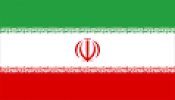 فارسی
فارسی العربية
العربية
